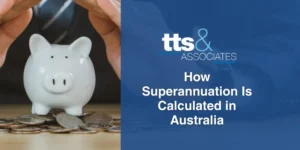Choosing the right self-managed super fund/SMSF accountant is critical for securing your retirement. At TTS Associates, our expert guidance simplifies SMSF management while ensuring full compliance with Australian regulations. In this post, we highlight key factors to consider so you can select a professional who meets your unique financial needs.

Key Takeaways
- Look for an accountant with solid SMSF qualifications and experience.
- Strong communication skills are a must; you want someone who can explain things clearly.
- Consider how tech-savvy the accountant is; modern tools can make managing your SMSF easier.
- Check their fee structure carefully to ensure you’re getting good value for your money.
- Ethics matter; choose an accountant who operates with honesty and integrity.
Understanding The Role Of A Self Managed Super Fund Accountant
Thinking about getting a Self Managed Super Fund (SMSF), or maybe you already have one? Either way, you’re probably wondering what an SMSF accountant actually does. It’s more than just crunching numbers. They’re like your guide through the sometimes confusing world of superannuation.
Key Responsibilities of SMSF Accountants
SMSF accountants wear many hats. Here’s a quick rundown:
- Financial Statements: They prepare all the necessary financial reports, so you know exactly where your fund stands. Think of it as a health check for your super.
Tax Returns: They handle the SMSF’s annual tax return, making sure everything is above board with the ATO. This can save you a lot of headaches. - Audit Assistance: They help prepare for the annual audit, which is a legal requirement for SMSFs. They ensure all your ducks are in a row.
- General Advice: They can offer advice on various SMSF matters, like contributions, pensions, and compliance. It’s good to have someone in your corner.
Importance of Compliance and Regulation
SMSFs come with a lot of rules and regulations. Messing these up can lead to some pretty serious penalties. That’s where an accountant comes in. They make sure your fund stays compliant, so you don’t end up on the ATO’s naughty list. They keep up to date with all the changes in legislation, so you don’t have to. It’s like having a compliance & administration expert on your team.
How They Support Investment Strategies
While they can’t give you specific investment advice (unless they’re also licenced financial advisors), SMSF accountants can help you understand the tax implications of your investment decisions. They can show you how different investment strategies might affect your fund’s tax liability. They can also assist in understanding the implications of your SMSF.
Essential Qualifications For SMSF Accountants
It’s not just about crunching numbers; it’s about making sure your super is in safe hands and growing the way it should. So, what qualifications should you be looking for? Let’s break it down.
Relevant Certifications and Memberships
Okay, so there’s no single ‘SMSF Accountant’ certificate, but there are definitely things to look for.
- Bachelor’s Degree: Ideally, your accountant should have a bachelor’s degree in accounting or finance. It’s the basic foundation.
- CA or CPA: Being a member of Chartered Accountants Australia and New Zealand (CA) or CPA Australia is a great sign. It means they’ve met certain education and experience standards, and they’re committed to ongoing professional development. Aim for someone with a CA or CPA qualification.
- Registered Tax Agent: If they’re lodging your tax returns (and they probably will be), they must be a registered tax agent with the Tax Practitioners Board (TPB).
Experience in SMSF Management
Qualifications are great, but experience is where the rubber hits the road. You want someone who’s been around the block a few times when it comes to SMSFs.
- Years of Experience: Look for someone with at least 3-5 years of experience specifically in SMSF accounting. They’ll have seen a wider range of situations and be better equipped to handle whatever comes your way.
- SMSF Specific Knowledge: SMSFs have their own set of rules and regulations, which are different from normal accounting. Make sure they know the ins and outs of SMSF compliance.
- Ask for Examples: Don’t be afraid to ask them about specific SMSF scenarios they’ve dealt with. It’ll give you a better sense of their practical experience.
Ongoing Professional Development
The world of superannuation is constantly changing. New laws, new regulations, new investment strategies, etc. That’s why it’s important your accountant is committed to ongoing professional development.
- Staying Updated: Ask them how they stay up-to-date with the latest changes in SMSF legislation. Do they attend seminars or read industry publications?
- Specialised Training: Have they undertaken any specific SMSF training courses or certifications? This shows a real commitment to the area.
- Membership Requirements: Being a member of CA or CPA requires a certain amount of continuing professional development (CPD) hours each year, so that’s another good indicator.
Evaluating Communication Skills
It’s not just about being friendly; it’s about understanding complex stuff and explaining it in a way that doesn’t make your head spin. Let’s break down what to look for.
Importance of Clear Communication
Clear communication is absolutely vital when it comes to managing your SMSF. You need to understand what’s going on with your investments, compliance. If your accountant can’t explain things simply, it’s a red flag.
- Can they explain complex tax laws without using confusing jargon?
- Do they take the time to answer all your questions, no matter how basic they might seem?
- Do they proactively keep you informed about important changes or deadlines?
Assessing Responsiveness and Availability
Responsiveness is key. You don’t want to be left hanging for days when you have a question or need something sorted. Here’s what to look for:
- Do they respond to emails and calls promptly? What’s their typical turnaround time?
- Are they available for meetings when you need them, or are they always booked out weeks in advance?
- Do they have a system in place for handling urgent queries? A dedicated superannuation team can be a great asset here.
Building a Trusting Relationship
Ultimately, you want to build a relationship with your accountant based on trust and mutual respect. Here’s how to gauge if you can build that kind of relationship:
- Do they listen to your concerns and take your individual circumstances into account?
- Do they explain their reasoning and recommendations clearly, so you understand why they’re doing what they’re doing?
- Do they act with integrity and transparency? Are they upfront about fees and potential conflicts of interest?
Finding an accountant who ticks all these boxes can make a huge difference to your SMSF experience.
Assessing Fees and Services Offered

Let’s talk about the money side of things – fees and services. It’s not just about finding the cheapest option; it’s about getting the best value for your hard-earned cash.
Understanding Fee Structures
Fee structures can be tricky. Some accountants charge hourly, others offer fixed fees, and some might even have a combination of both. Here’s a quick rundown:
- Fixed Fees: You pay a set amount for a specific package of services. This is great for budgeting because you know exactly what you’re going to pay. Look into SMSF accounting fees to get an idea of what to expect.
- Hourly Rates: You’re charged based on the time the accountant spends on your work. This can be good if your needs are simple, but it can also be unpredictable.
Always ask for a detailed breakdown of what’s included in the fees. Don’t be afraid to ask questions.
Comparing Services Across Accountants
Not all accountants are created equal. Some offer a basic service, while others go above and beyond. Consider what’s important to you:
- Compliance: This is a must-have. Make sure they’re on top of all the regulations and reporting requirements.
- Tax Advice: Do they offer proactive tax planning advice, or just prepare your return?
- Audit Assistance: Will they help you if your fund gets audited?
- Additional Services: Some accountants also offer business advisory services, which can be a bonus if you run a small business.
Value for Money in SMSF Management
Ultimately, it’s about finding the right balance between cost and service. Here’s how to assess value for money:
- List Your Needs: What are your must-haves and nice-to-haves?
- Get Quotes: Contact several accountants and get detailed quotes.
- Compare Apples to Apples: Make sure you’re comparing the same services.
- Read Reviews: See what other people are saying about their experiences.
- Trust Your Gut: Choose an accountant you feel comfortable with and who you trust to act in your best interests.
Remember, the cheapest option isn’t always the best value. It’s worth paying a bit more for peace of mind and expert advice.
Finding The Right Fit For Your SMSF Needs
Let’s break down how to make sure your accountant is a great fit for your needs.
Identifying Your Specific Requirements
What do you actually need? Think about your SMSF’s current situation and your future goals. It’s all about figuring out what you need from an accountant. Here’s a few things to consider:
- Complexity: Is your SMSF straightforward, or does it involve complex investments like property or overseas assets? The more complex, the more specialised your accountant needs to be.
- Involvement Level: Do you want to be hands-on with your SMSF, or do you prefer to hand over most of the admin?
- Growth Plans: Are you planning on making significant changes to your investment strategy soon? Make sure your accountant is across your plans.
Scheduling Initial Consultations
Treat these consultations like a first date. Come prepared with questions! It’s a chance to see if you click and if they understand your needs. Don’t be afraid to ‘shop around’.
- Prepare a list of questions beforehand.
- Ask about their experience with SMSFs similar to yours.
- Get a feel for their communication style.
Creating a Comparison of Candidates
Time to get organised! Create a simple table or spreadsheet to compare your potential accountants. This will help you see the pros and cons of each at a glance. Consider things like fees, services offered, and their overall vibe. Remember to check out SMSF suitability before making any decisions.
Here’s a simple example:
| Accountant | Fees | Services | Communication | |
| Accountant A | $$$ | Basic | Slow | |
| Accountant B | $$$$ | Full | Prompt | |
| Accountant C | $$ | Limited | Average |
Choosing the right accountant is a big deal, but with a bit of planning, you can find someone who’s a perfect fit for your SMSF needs.
The Importance Of Ethical Practises
It’s easy to get caught up in fees and services, but don’t forget the ethical side of things. You’re trusting someone with your retirement savings, after all!
Understanding Ethical Standards in Accounting
Accountants have a code of ethics they’re supposed to follow. It’s all about honesty, integrity, and being objective. Basically, they need to put your interests first, not their own. It’s like when my mate’s mechanic tried to charge him for a new muffler when all it needed was a quick weld – totally unethical!
How Ethics Impact Your SMSF
If your accountant isn’t ethical, it can cause big problems. Think dodgy advice, hidden fees, or even illegal activities. This can put your SMSF at risk and land you in hot water with the ATO.
Here’s what can happen if ethics go out the window:
- Non-compliance with regulations, leading to penalties.
- Mismanagement of tax planning, potentially losing your savings.
- Compromised building trust due to conflicts of interest.
Choosing an Accountant with Integrity
So, how do you find an ethical accountant? Here are a few tips:
- Check their professional affiliations (like CPA or IPA).
- Ask for references and actually call them!
- See if they have a clear complaints process.
- Trust your gut – if something feels off, it probably is.
Ethical practices are really important in any business. They help build trust and respect between companies and their customers. When businesses act honestly and fairly, they create a better environment for everyone.
Final Thoughts on Choosing Your SMSF Accountant
Your SMSF accountant is vital for safeguarding your retirement savings. With TTS Associates, you benefit from personalised, expert advice to manage your fund effectively. For tailored SMSF solutions and further support, please contact our experienced team. Secure your financial future with trusted, professional guidance from TTS Associates.
- Expert guidance tailored to your SMSF needs
- Personalised, compliant solutions for retirement savings
- Contact TTS & Associates for further support and advice
Frequently Asked Questions
What does a Self Managed Super Fund accountant do?
An SMSF accountant helps you manage your super fund. They handle paperwork and make sure you follow the rules.
How do I know if an SMSF accountant is qualified?
You should check if the accountant has the right certifications and experience in managing SMSFs. It’s also good if they are part of a professional organisation.
Why is communication important with my accountant?
Good communication helps you understand your finances better. You want an accountant who can explain things clearly and is available to answer your questions.
What technology should my SMSF accountant use?
Your accountant should use software that helps manage your SMSF easily and securely. This can include tools for sharing documents and tracking investments.
How are SMSF accountant fees structured?
Accountants may charge by the hour or have a flat fee for their services. It’s important to understand what you’re paying for and compare fees from different accountants.
What should I consider when choosing an accountant for my SMSF?
Think about your specific needs, budget, and the accountant’s experience. Meeting them for a consultation can help you see if they are a good fit.




